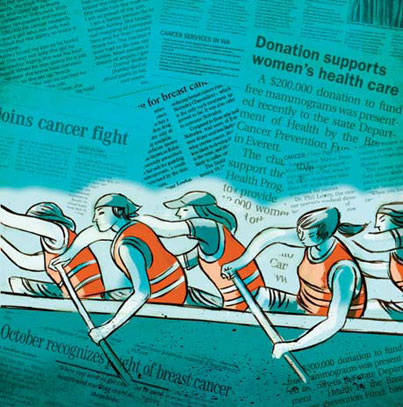Insights (Page 2)
Women in Charge

Former British prime minister Margaret Thatcher
Brian Harris/Rex Features
After winning the Quebec Writers' Federation's first book prize for Shame and Humiliation: Presidential Decision Making in Vietnam, Blema Steinberg, BA'55, PhD'61, wondered what to do for an encore. Shame and Humiliation dealt with U.S. presidents Dwight Eisenhower, Lyndon Johnson and Richard Nixon.
"I'd looked at three male presidents. So, I [should] look at some women now. You know, equal time."
The result is Women In Power: The Personalities and Leadership Styles of Indira Gandhi, Golda Meir, and Margaret Thatcher, published this spring by McGill-Queen's University Press.
An emeritus professor of political science at McGill, Steinberg applies both her poli-sci know-how and her psychoanalytic skills (she is also a practising therapist), in examining the behaviour of leaders.
The three women chronicled in her latest book have a lot in common. For one, all three were underestimated at the start.
"None of them were the first choice of their party," says Steinberg. All were considered compromise candidates, and Gandhi in particular was chosen because it was believed she could be easily manipulated. Political king makers — or in these cases queen makers — who assumed they might yield more influence over women candidates were, however, sadly mistaken. Steinberg's research shows that these three women score much higher on dominance traits than is typical of male leaders. "They're all very controlling, domineering and assertive," says Steinberg.
Looking at the race for the Democratic presidential nomination south of the border, Steinberg says that it's Barack Obama, not Hillary Clinton, who seems to better typify the so-called "female" style of leadership, with its emphasis on consensus building. "One of the things said about Obama, when he was editor of the Harvard Law Review, was that he would listen to everyone's opinion and they just wished he would make up his mind. Whereas with Hillary, one worries that she'll make decisions too precipitously."
A Prescription for Paddling

Matt Forsythe
What's the best long-term therapy for breast cancer survivors? A McGill researcher offers a surprising suggestion. Her prescription? Dragon boat racing.
Breast cancer survivors who participated in dragon boat racing reported significantly improved physical and mental health and coped better with post-recovery trauma, according to a study conducted by Catherine Sabiston, an assistant professor in McGill's Department of Kinesiology and Physical Education. The results of her research — conducted while she was a PhD student at the University of British Columbia — were recently published in the Journal of Sport & Exercise Psychology.
"For these women, the diagnosis and treatment of cancer were devastating," Sabiston says. "There was a huge amount of stress, which continued with the treatment and the worry of recurrence. They live every day with the worry, 'Could this be the day my cancer comes back?'"
For her study, Sabiston focused on 20 cancer survivors who had taken up dragon boat racing, an ancient Chinese sport dating back to the 4th century BCE. The boats are long, canoe-like craft, crewed by teams of 10 to 20 paddlers, plus a drummer at the bow (whose rhythmic beating spurs on the paddlers) and a tiller (to steer) at the stern.
Sabiston interviewed the women to find out about their experiences in the sport and she was struck by what she heard.
"The physical activity itself and the women the participants met acted as a sort of buffer to the enduring stresses of cancer recovery. They started to live their lives like athletes. It was extremely empowering."


